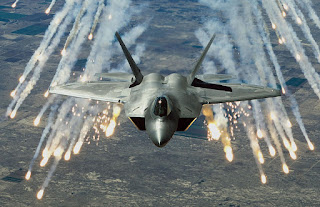Fighter Jets Military
The request for proposals (RFP) was issued in July 1986 and two contractor teams, Lockheed/Boeing/General Dynamics and Northrop/McDonnell Douglas, were selected on 31 October 1986 to undertake a 50-month demonstration phase, culminating in the flight test of two technology demonstrator prototypes, the YF-22 and the YF-23. The program was managed by the Advanced Tactical Fighter Systems Program Office (ATF SPO) located at Wright-Patterson Air Force Base.
Each design team produced two prototype air vehicles, one for each of the two engine options. The Lockheed-led team employed thrust vectoring nozzles on YF-22 for enhanced maneuverability in dogfights. The ATF's increasing weight and cost drove out certain requirements during development. Side-looking radars were deleted, and the dedicated infra-red search and track (IRST) system was downgraded from multi-color to single color and then deleted as well. However, space and cooling provisions were retained to allow for future addition of these components. The ejection seat requirement was downgraded from a fresh design to the existing McDonnell Douglas ACES II.
After the flight test demonstration and validation of the prototypes, on 23 April 1991, Secretary of the USAF Donald Rice announced the YF-22 as the winner of the ATF competition. The YF-23 design was considered stealthier and faster, while the YF-22 was more maneuverable. The aviation press speculated that the YF-22 was also more adaptable to the U.S. Navy's Navalized Advanced Tactical Fighter (NATF), but by 1992, the Navy had abandoned NATF. More details
In 1981, the U.S. Air Force developed a requirement for an Advanced Tactical Fighter (ATF) as a new air superiority fighter to replace the F-15 Eagle and F-16 Fighting Falcon. Code named "Senior Sky", this program was influenced by the emerging worldwide threats, including development and proliferation of Soviet Su-27 "Flanker"- and MiG-29 "Fulcrum"-class fighter aircraft. It would take advantage of the new technologies in fighter design on the horizon, including composite materials, lightweight alloys, advanced flight control systems, more powerful propulsion systems, and stealth technology.
The request for proposals (RFP) was issued in July 1986 and two contractor teams, Lockheed/Boeing/General Dynamics and Northrop/McDonnell Douglas, were selected on 31 October 1986 to undertake a 50-month demonstration phase, culminating in the flight test of two technology demonstrator prototypes, the YF-22 and the YF-23. The program was managed by the Advanced Tactical Fighter Systems Program Office (ATF SPO) located at Wright-Patterson Air Force Base.
Each design team produced two prototype air vehicles, one for each of the two engine options. The Lockheed-led team employed thrust vectoring nozzles on YF-22 for enhanced maneuverability in dogfights. The ATF's increasing weight and cost drove out certain requirements during development. Side-looking radars were deleted, and the dedicated infra-red search and track (IRST) system was downgraded from multi-color to single color and then deleted as well. However, space and cooling provisions were retained to allow for future addition of these components. The ejection seat requirement was downgraded from a fresh design to the existing McDonnell Douglas ACES II.
After the flight test demonstration and validation of the prototypes, on 23 April 1991, Secretary of the USAF Donald Rice announced the YF-22 as the winner of the ATF competition. The YF-23 design was considered stealthier and faster, while the YF-22 was more maneuverable. The aviation press speculated that the YF-22 was also more adaptable to the U.S. Navy's Navalized Advanced Tactical Fighter (NATF), but by 1992, the Navy had abandoned NATF. More details

